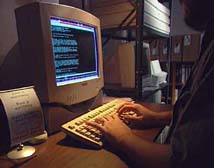Internet An Ideal Tool For Extremists - FBI
Published:
17 November 2001 y., Saturday
Modern information technology is facilitating new organizational models used by extremist groups, according to the FBI's National Infrastructure Protection Center (NIPC).
Technologies such as Internet relay chat (IRC), Web-based bulletin boards, and free e-mail accounts are enabling extremist groups to adopt a structure known as "leaderless resistance," according to an unclassified document published Nov. 10 by the NIPC.
"An extremist organization whose members get guidance from e-mails or by visiting a secure Web site can operate in a coordinated fashion without its members ever having to meet face to face," said the report, which was prepared by NIPC cyber-terrorism experts.
Extremist groups have adopted the leaderless resistance model in part to "limit damage from penetration by authorities" seeking information about impending attacks, the NIPC said.
Besides offering a medium for secure communications, Internet technologies also enable extremists to provide a "steady stream of propaganda" aimed at recruitment and indoctrination.
The report also said that electronic communication tools such as IRC and America Online's ICQ chat software enable widely dispersed members to share information "in support of a common (and sometimes violent) goal."
Šaltinis:
newsbytes.com
Copying, publishing, announcing any information from the News.lt portal without written permission of News.lt editorial office is prohibited.
The most popular articles
Software company announced new structure_ of it_s business.
more »
 A number of MEPs urged Internal Market Commissioner Michel Barnier to come up with common rules to regulate cross border online gambling in Europe.
more »
A number of MEPs urged Internal Market Commissioner Michel Barnier to come up with common rules to regulate cross border online gambling in Europe.
more »
 Think before you post as once you do it is online forever. That was the message on Safer Internet Day marked on 9 February by a seminar in the European Parliament.
more »
Think before you post as once you do it is online forever. That was the message on Safer Internet Day marked on 9 February by a seminar in the European Parliament.
more »
 50% of European teenagers give out personal information on the web – according to an EU study – which can remain online forever and can be seen by anybody.
more »
50% of European teenagers give out personal information on the web – according to an EU study – which can remain online forever and can be seen by anybody.
more »
 When did the Commission start working on social networking sites?
more »
When did the Commission start working on social networking sites?
more »
 ICSA Labs, an independent division of Verizon Business, is the first independent security-product testing and certification laboratory to earn ISO/IEC 17025 accreditation, validating the laboratory's world-class capabilities.
more »
ICSA Labs, an independent division of Verizon Business, is the first independent security-product testing and certification laboratory to earn ISO/IEC 17025 accreditation, validating the laboratory's world-class capabilities.
more »
 From today, European citizens, businesses and organisations can register .eu website names using characters from all 23 official languages of the European Union.
more »
From today, European citizens, businesses and organisations can register .eu website names using characters from all 23 official languages of the European Union.
more »
 Authorities investigated 301 mobile phone services websites in follow-up to EU crackdown on misleading consumer practices.
more »
Authorities investigated 301 mobile phone services websites in follow-up to EU crackdown on misleading consumer practices.
more »
 After nearly 2 years of legislative work the Telecom Package is due to be put to a final vote in Parliament on 24 November in Strasbourg.
more »
After nearly 2 years of legislative work the Telecom Package is due to be put to a final vote in Parliament on 24 November in Strasbourg.
more »
 The Christian Science Monitor reports that three men have been named as being the masterminds behind the hacking of RBS WorldPay, a subsidiary of the Royal Bank of Scotland.
more »
The Christian Science Monitor reports that three men have been named as being the masterminds behind the hacking of RBS WorldPay, a subsidiary of the Royal Bank of Scotland.
more »
 BAI’s Banking Strategies Insights reports that banks must get serious about improving their ATMs, especially in the area of envelope-free deposit.
more »
BAI’s Banking Strategies Insights reports that banks must get serious about improving their ATMs, especially in the area of envelope-free deposit.
more »